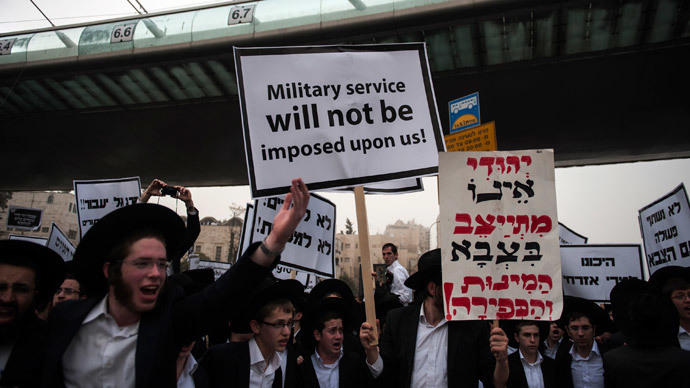Ultra-Orthodox Jews mass-protest in Jerusalem over army-service draft law

Thousands of ultra-Orthodox Jews have paralyzed most of Jerusalem as men, women and children took to the streets to protest an army service bill that would require many of them to serve in the military.
Local media called the protest “a million man march” and put a number of participants between 250,000 to 400,000 people, while organizers said nearly 500,000 Haredi - ultra-Orthodox men as they are called in Israel – attended the rally.
The police could not give an exact number, but spokesman Micky Rosenfeld said that undoubtedly hundreds of thousands men, women and children were present.
Dressed in black hats and long black jackets, members of the Haredi community waved signs in Hebrew and English accusing the government of attempting to suppress religion.
Some of the banners read: "Military service will not be imposed on us" and "Jews cannot survive without the Torah."
Many wore sackcloth as a symbol of grief because of the draft law which may oblige ultra-Orthodox Jews to join the military after decades of being granted rights not to serve in the army, unlike all non-Haredi Jewish men and women.
As the men were rallying, women and children, due to the community's standards of modesty, stood on separate streets, praying.

The rally was organized by the religious and political leadership of the Haredi community that makes up about 10 percent of Israel's 8 million people. Ultra-Orthodox leaders strongly oppose mandatory army recruitment on the grounds that it would deny their yeshiva students the fulfillment of the main tradition – a full-time study of Holy Scriptures - which Haredi see as a foundation of Jewish life.
Protesters began demonstrating outside the capital’s convention center even before the rally was set to officially begin at 4 pm local time.
People began arriving early in the morning to avoid traffic standstills at the entrance to the city. The protest kicked off with a mass prayer service and brought much of the city to a standstill with the main road between Jerusalem and Tel Aviv was closed for all traffic. Transportation within the city was severely disrupted with the Jerusalem Central Bus Station also shut down in the afternoon. Most of the offices and schools were also closed.
A total 3,500 officers and several helicopters were deployed to ensure order at all times. The protest overall was peaceful, but there have been a number of injured. Jerusalem Post cites Israeli EMS - Magen David Adom - which said that it treated 74 protesters at the rally. All of the treated protesters were said to have been lightly injured and suffered from weakness, minor bruising. Some had difficulty breathing because of the hazy weather, MDA said.

Haredi army service has been a subject of fierce debate between ultra-Orthodox and more secular Jews.
The initial army exemption law for ultra-Orthodox Jews was established by Israel’s first Prime Minister David Ben-Gurion, who agreed with Haredi rabbis and allowed believers to study rather than fight citing the idea of restoring the world of Torah study that was destroyed by the Holocaust.
Back then the numbers of those excused from service was relatively small, but it has since increased with hundreds of thousands of ultra-Orthodox Jews still not required to serve.
As most Israelis are required by law to serve a two to three-year stint in the military after their 18th birthday, they say it is unfair that Haredi men usually opt for religious studies over paid employment. Most Haredi men, many of whom have eight or more children, are unemployed and live off state benefits, donations and their wives' often low income.
The country’s secular majority has been putting increasing pressure on the government for more equitable military service laws. For the first time in a decade, Israel's cabinet has no ultra-Orthodox members and the main coalition partners have pressed Prime Minister Benjamin Netanyahu to enact reforms.
The so-called ‘Tal Law’ which allowed Arab-Israelis and ultra-Orthodox Jews to be exempt from military service was passed in 2002, but expired on August 1 of 2012.
The new legislation that proposes enlisting all Israeli men and women between ages 18 to 22 has been in the works since last summer, when it received initial approval from the Israeli cabinet.
In February a parliamentary committee passed a clause that would allow criminal penalties on non-compliant ultra-Orthodox Jews who refuse to report for duty.













